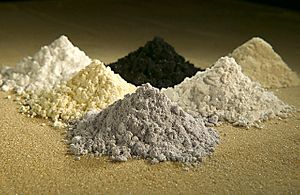A World Trade Organization panel determined on Wednesday that China was in contravention of international trade law over its export restrictions on rare earth elements and other raw materials. These materials are used across a host of international industries for a variety of manufacturing purposes and the WTO found that Beijing’s use of export taxes, quotas, and bureaucratic delays effectively raised prices by creating an artificial shortage. The WTO panel’s formal conclusion was that “China’s export quotas were designed to achieve industrial policy goals.”
China, in its defense, argued that the rare earth export restrictions were geared towards preserving its environment — the WTO’s decision did not acknowledge that. In response to the ruling, China was noticeably disappointed. “As a responsible WTO member, we respect relevant rules. But we regret that and we will continue our efforts to protect the environment and natural resources, and maintain our rights to argue,” Zhang Anwen, vice secretary-general of the Chinese Society of Rare Earths, told China’s Global Times following the decision.
The European trade commissioner, Karel De Gucht, said, “China cannot use export restrictions to protect its own industries or give them a helping hand on the global market at the expense of foreign competitors.” The WTO case was first filed by the United States in March 2012 and both Japan and the European Union came on board shortly afterwards. The United States remains almost entirely dependent on Chinese rare earth metals, so the case was particularly urgent for the U.S. government.
Rare earth metals are used in all sophisticated modern electronic devices including computers, smart phones, cars, magnetic devices, and turbines. China produces an overwhelming majority of the world’s rare earth metal supply — 90 percent of all rare earth metals used in global industry originate in China. Beijing has taken advantage of its near-monopoly power in the past. In 2010, Beijing cut export quotas by 40 percent, causing prices to skyrocket. That same year, China punished Japan for the detention of a Chinese fishing boat captain near the disputed Senkaku/Diaoyu islands by temporarily embargoing rare earth exports to Japan. Rare earth metals are critical to many of Japan’s largest industries and the economic damage prompted Japan to seek out a rare earth cooperation agreement with India in 2012.
The ruling may further convince Chinese observers that the WTO’s rules are detrimental to China’s interests. The perception that the WTO is unbalanced and tilted towards the West is common in China. One consultant for the Shanghai WTO Affairs Consultation Center notes that “the rules of the WTO are not in [China’s] favor.” “The US, Japan and the EU formed a hunting party against China. They sued China in 2012 over the export of nine kinds of raw materials and this time they staged the same drama over rare earth,” notes one Chinese analyst cited by the Global Times.
Chinese indignation over the report is not unfounded. China has credibly demonstrated that its rare earth mining activities are hugely damaging to the environment. Further, the WTO does not prohibit export taxes across the board. The reason China’s activities came under scrutiny was because of a specific agreement between China and other countries that limited the amount of export duties that were practicable — rare earth metals were not included in that agreement.
So far, China’s intention to appeal the decision is unclear, but likely. A Chinese statement notes that they are “assessing the panel report and will follow the WTO dispute settlement procedures to settle this dispute.” This trade dispute will be one to watch in coming months and could have important ramifications for global rare earth prices.

































